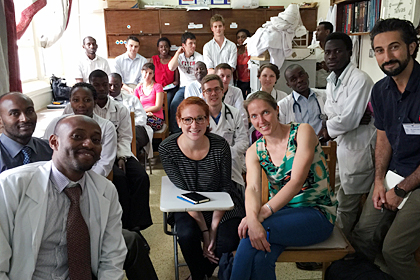
Mary Kate LoPiccolo '18, center, with Alexandra Miller '18, and a group of international participants in a tropical medicine course in Uganda taught by Majid Sadigh, M.D., director of the UVM/WCHN Global Health Program. (Photo: Tyler Sizemore)
University of Vermont medical student Mary Kate LoPiccolo understands what it takes to have the best global health elective possible. The Class of 2018 member spent six weeks in Uganda in summer 2015 following completion of her first year of medical school.
While working at a small family-planning clinic in Nakaseke, Uganda, she observed a patient who wanted birth control expressing concern about coming every week for proposed injections. The woman told the doctors that her husband might feel the spot in her arm and get angry about her attempts to prevent a pregnancy. LoPiccolo listened, and kept a steady gaze to reveal no judgment about the woman’s relationship.
In the United States, a doctor might have asked the patient about prejudice and potential abuse in the marriage, says LoPiccolo. “But you have to respect the host (country) and keep in mind that treating the patients with dignity is your job, regardless of their or their nation’s beliefs.”
Her experience presented the kind of ethical challenge that students in global health programs frequently face during their overseas training. And for LoPiccolo, it illustrates the importance of selecting the right students for these programs – those well-equipped to handle such challenges.
“Very few places have guidelines for admission,” she says. “It’s basically: If you’re interested, you’re in.”
LoPiccolo, though, says a successful global health program depends on a robust screening system. The Class of 2018 student recently developed a methodology to assist medical schools with global health candidate selection. Her paper, “Finding the Perfect Match: Creating a Structured Interview Tool to Choose Candidates for Global Health Electives,” was published as an “Online First” article August 5, 2016 in the journal Medical Science Educator. Majid Sadigh, M.D., director of the Western Connecticut Health Network/UVM Global Health Program, coauthored the paper with LoPiccolo.
The project launched in 2013, when she took time off before starting medical school and worked at Sadigh’s home base – Danbury Hospital, which is part of the UVM College of Medicine’s clinical teaching partner Western Connecticut Health Network (WCHN). During some free time between projects, LoPiccolo and Sadigh chatted about the imperfect way most schools pick their global health students. He suggested that she look at medical school admissions processes and consider applying them to global health review.
LoPiccolo surveyed faculty members and student leaders from several medical schools’ global health programs and asked them to rank the areas of competency that they consider most important. From this research, she learned that their rankings, reflecting the real successes and failures they have witnessed, differed somewhat from those identified in the literature.
For example, the top-ranked characteristics among the global health experts were adaptability and flexibility. In the literature, LoPiccolo says, those qualities ranked sixth most important.
But, advised Sadigh, they’re crucial in a place like Uganda, where religion is fundamental in people’s lives and influences their approach to medical care to an extent that would be questionable in the United States. He witnessed a student belittling a Ugandan patient’s reservation about a treatment due to religious beliefs, which demonstrated that even an academically astute student can lack cultural sensitivity.
“Being in an environment like that and stepping back without criticizing was difficult for that student,” she says.
Using the experts’ rankings, LoPiccolo came up with an interview tool that could best identify those competencies and a scorecard based on a weighted system for interviewers to evaluate students’ answers.
LoPiccolo found writings by two Yale University students that described their global health experiences and used them to create scenarios for interview questions. While the Yale students had worked in Uganda, the interview tool can apply to any location, LoPiccolo says. Questions for students for a Russian host site, for example, might focus more on cultural and political differences.
“That was the major contribution, I think, that we’ve made,” LoPiccolo said. “And then we leave it up to the institutions to adapt it to their programs.”
In fall 2015, UVM screened its global health candidates using LoPiccolo’s tool for the first time and met afterwards with students to get their feedback. LoPiccolo hopes to develop a training program for interviewers and conduct a larger pilot study to determine how well her methodology translates to long-term success.